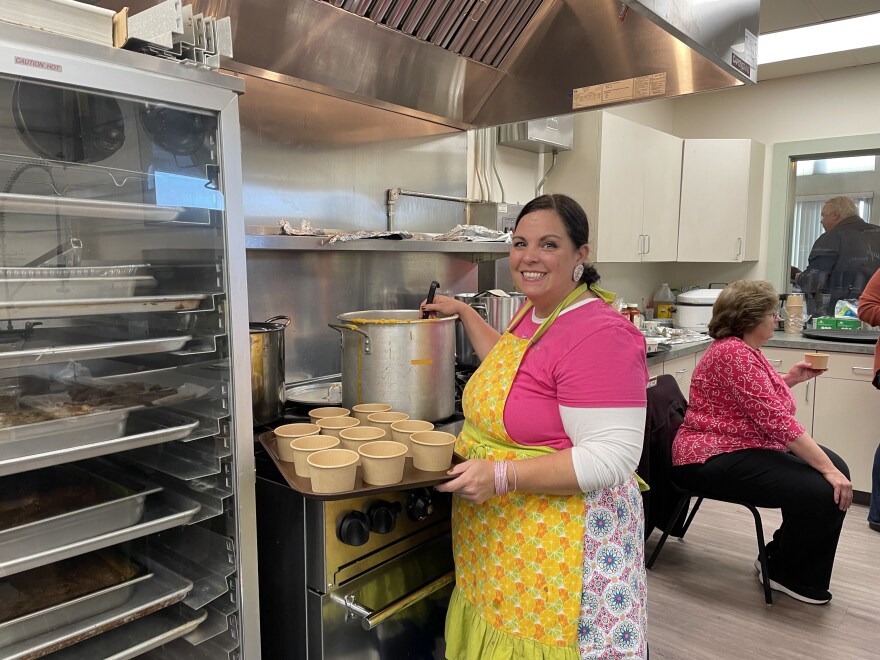Editor’s Note: Since the initial publication of this story, NHPR has reported that citizens of a federally recognized Abenaki First Nation based in Canada say there is no evidence many members and leaders of two New Hampshire groups have Abenaki ancestry. An NHPR review of genealogies and other records also failed to support local leaders’ claims of Abenaki ancestry.
Dozens of people gathered in Contoocook Riverway Park on Monday to celebrate Indigenous Peoples' Day, at an event organized by the Abenaki Trails Project and the Hopkinton Historical Society.
Local artist Carol Lake presented a new sculpture to the audience, which will be installed near the Contoocook River. The sculpture depicts an elder Abenaki person and someone from the younger generation.
Sherry Gould, the tribal genealogist for the Nulhegan Band of the Coosuk Abenaki Nation and an organizer of the event, served as one of the models for the sculpture. She hopes the art will be an emblem of the history and continued presence of Abenaki people in New Hampshire.
“I think that’s really what we want to help people seep into their brains: That we were here, and we are here,” she said.

Speakers included Abenaki leaders, local and state officials, the director of the Mt. Kearsarge Indian Museum, and leaders working with local farmers.
Hanna Flanders was there representing the Kearsarge Food Hub. She spoke about the Abenaki Seeds Project, an effort that connects local growers with heritage seeds. The produce is donated to an Abenaki food pantry.
“We’re on a mission to reinvigorate our community within a restorative local food system," she said. "And of course, you cannot do that sincerely, wholeheartedly, without centering Indigenous foodways, Indigenous people."
The Abenaki Seed Project had 50 growers participate this year, their second year running, Flanders said.
Later, visitors gathered at the Slusser Senior Center to eat food prepared by two Abenaki chefs — Darryl Peasley and Liz Charlebois — which showcased produce from the seed project.
As the late afternoon sun shone through large windows, a crowd tasted venison stew, bison sandwiches, bread pudding and more from Peasley, who said it took all weekend to create the feast.
He co-founded the Abenaki Trails Project, which got its start in Contoocook and aims to educate visitors about Abenaki people and history. He said he hoped the event left attendees curious.
“What I want them to want is to learn more about Native life, Native people, come to some of our events,” he said. “We’re not trying to rewrite history, we’re just trying to tell the truth about history.”
Charlebois created three of the dishes served to the crowd: an Algonquian pumpkin smothered in maple syrup, boiled cornbread with a berry dish called Wonôbo and squash soup.
“We used Blue Hubbard squash and butternut squash — winter squashes,” she said. “Squash is one of those really important food crops to use — corn, beans and squash, the three sisters. It’s a major food staple.”
Charlebois has moved to Vermont, but she lived in the Contoocook area for 15 years and said it was meaningful to celebrate there.
“It’s really sort of validating to be able to celebrate Indigenous People's Day in my community, in my home, and that to be okay. It hasn’t always been okay to be Indigenous from a government perspective,” she said. “It’s nice to be able to exist in New Hampshire.”
As visitors ate, Charlebois’s mother, Willow Green, caught the attention of the entire room with her storytelling. Charlebois remained hard at work, spooning her soup into small bowls.
“Today of all days —but every day — it’s important to remember that those Indigenous people are here, and we’re still practicing our culture and we’re still eating our food,” Charlebois said. “We’re still here.”








